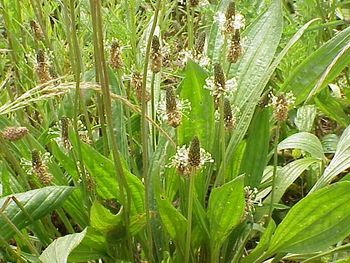Ribwort Plantain
From Wikiwel
(Redirected from Buckhorn Plantain)
Other Names: Plantago lanceolata, Buckhorn, Buckhorn Plantain, English Plantain, Chimney-Sweeps, Headsman, Herbe aux Cinq Côtés, Herbe à Cinq Coutures, Hoary Plantain, Llantén, Llantén Menor, Oreille de Lièvre, Petit Plantin, Plantago lanceolata, Plantaginis Lanceolatae Herba, Plantain, Plantain à Feuilles Étroites, Ribgrass, Ribwort, Ribwort Plantain, Ripplegrass, Small Plantain, Soldier's Herb, Spitzwegerichkraut.
Buckhorn plantain is a plant. People use the parts that grow above the ground for medicine.
Special Precautions of Buckhorn Plantain
- Buckhorn plantain might be safe for most people in medicinal doses when taken by mouth or applied to the skin. It can trigger allergies in sensitive people.
- Pregnancy and breast-feeding: It’s UNSAFE to take buckhorn plantain or apply it to your skin if you are pregnant. There is some evidence that buckhorn plantain can affect the muscle tone of the uterus.
- It’s also best to avoid buckhorn plantain if you are breast-feeding. There isn’t enough information to know if it’s safe.
- Don't confuse with Buckthorn.
Benefits and uses of Buckhorn Plantain are
Buckhorn plantain contains tannins and mucous-like substances that might help soothe painful and swollen (inflamed) areas.
- The common cold.
- Cough.
- Fevers.
- Bleeding.
- Bronchitis.
- Sore mouth.
- Sore throat.
- Wounds, bleeding, and swelling, when applied to the affected area.
- In the traditional Austrian medicine Plantago lanceolata leaves have been used internally (as syrup or tea) or externally (fresh leaves) for treatment of disorders of the respiratory tract, skin, insect bites, and infections.
References
- Vogl S, Picker P, Mihaly-Bison J, et al. (October 2013). "Ethnopharmacological in vitro studies on Austria's folk medicine--an unexplored lore in vitro anti-inflammatory activities of 71 Austrian traditional herbal drugs". Journal of Ethnopharmacology. 149 (3): 750–71. doi:10.1016/j.jep.2013.06.007. PMC 3791396Freely accessible. PMID 23770053.
- Phenylethanoids in the Herb of Plantago lanceolata and Inhibitory Effect on Arachidonic Acid-Induced Mouse Ear Edema. Michiko Murai (nee Sasahara), Yasuhiko Tamayama and Sansei Nishibe, Planta Med., 1995;, volume 61, issue 5, pages 479-480, doi:10.1055/s-2006-958143
- Genetic variation in defensive chemistry in Plantago lanceolata (Plantaginaceae) and its effect on the specialist herbivore Junonia coenia (Nymphalidae). Lynn S. Adler, Johanna Schmitt and M. Deane Bowers, Oecologia, January 1995, Volume 101, Issue 1, pages 75-85, doi:10.1007/BF00328903
